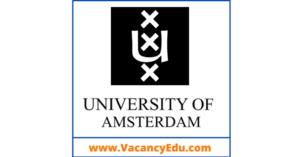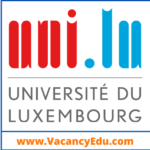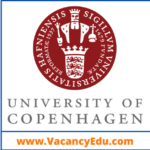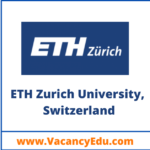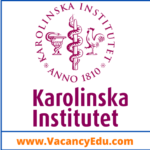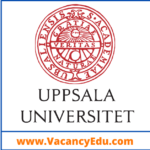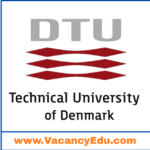University of Amsterdam, Netherlands invites online Application for number of Fully Funded PhD Degree at various Departments. We are providing a list of Fully Funded PhD Programs available at University of Amsterdam, Netherlands.
Eligible candidate may Apply as soon as possible.
(01) PhD Degree – Fully Funded
PhD position summary/title: PhD Position in Secure Multi-party Computation
We are looking for a PhD student to join our team and contribute to cutting-edge research in theoretical computer science, with a focus on Secure Multi-Party Computation. You will join the Theory of Computer Science group at the Informatics Institute.
This PhD project aims to push the boundaries of our understanding of the feasibility of MPC protocols, as well as design more efficient protocols for real-world applications. The project is funded by the NWO Gravitation project “Challenges in Cyber Security”, a collaboration with partners from TU Eindhoven, Radboud University, CWI and Vrije Universiteit Amsterdam. The PhD candidate will have ample opportunities to collaborate with leading scientists from these institutions, as well as with the broader, vibrant community of theoretical computer science researchers in Amsterdam (https://theory.amsterdam).
Deadline : 16-4-2025
(02) PhD Degree – Fully Funded
PhD position summary/title: PhD positions in animating metamaterials
This unique research opportunity revolves around the fields of active matter, metamaterials and robotics, combining experimental, numerical, and theoretical approaches. The primary focus of the project lies in investigating various aspects, such as non-reciprocity in soft matter, topology, instabilities, odd viscosity and elasticity, and pattern formation within metamaterials.
The specific research project will be custom-tailored to align with the interests and expertise of the successful candidate, fostering a collaborative and fulfilling environment. Together, we will mutually agree on the direction of the research, ensuring it aligns with your passion and aspirations.
Deadline : 1-4-2025
View All Fully Funded PhD Positions Click Here
(03) PhD Degree – Fully Funded
PhD position summary/title: PhD Position in Argumentation, Identity and the Public Sphere
In this research project, Expressing Identity in Public Discourse through Argumentation, argumentation is investigated as a mode of communication through which people can present themselves and others in interactions. Although argumentation may have many functions, among which particularly its function in persuasion and building consensus is well-established, the use of argumentation to express identity and social relationships has to be studied in more detail.
In the field of language and social interaction, identity and the presentation of self has been a central concern and various theories have been developed to understand how utterances are used to position oneself and one’s interlocutor. In the context of public discussions, argumentation is used not only to convince others, but also to position oneself or one’s group within a larger public sphere. The processes of creating groups and projecting relationships and hierarchies are central to public argumentation and are deeply intertwined with identity concerns. It is these arguments, not necessarily or exclusively meant to convince anyone in a difference of opinion, which are the focus of this project: arguments which may project attitudes, relationships and social status.
In this project, the PhD will collaborate with the principal investigator to connect literature on communication and identity to argumentation theory, resulting in an analytic model for empirical analyses that has clear links with current research in argumentation theory. The researcher will primarily focus on connecting insights in (interactional) sociolinguistics, linguistic anthropology and/or discourse/conversation analysis to the field of argumentation theory, and can develop these connections on a case study of their choice. The researcher compiles their own corpus and designs their own study within the scope of the project. In particular, this project starts from the premise that argumentation can be highly productive in creating an in-group and feelings of belonging, particularly in the public sphere. The researcher is expected to contribute with their project to the study of communication in the public domain.
Deadline : 15-4-2025
(04) PhD Degree – Fully Funded
PhD position summary/title: PhD in Entrepreneurship and Innovation
This PhD project investigates the synergies (and tensions) between innovation, commercial success, and subculture dynamics within the empirical settings of techno music and tech startups. Central to this inquiry is how cultural and structural mechanisms enable the techno subculture to shape entrepreneurial activity in tech startups—and the systems and processes behind this influence. Conversely, do the practices, norms, and values of tech entrepreneurship feed back into the artistic and communal dimensions of techno culture- and if so, through what pathways or modalities? This project explores these questions while also considering external factors such as market trends, technological advancements, and socio-economic conditions. Additionally, it examines how subcultures maintain their unique identities while fostering new ideas, driving innovation, and creating economic opportunities. The findings will provide valuable insights into the intersection of creative industries, innovation and entrepreneurship, highlighting the key role of subcultures in shaping vibrant and innovative ecosystems.
Deadline : 2-4-2025
(05) PhD Degree – Fully Funded
PhD position summary/title: PhD in Entrepreneurship and AI
The rise of advanced AI technologies is revolutionizing entrepreneurship and innovation. AI is no longer just a tool—it is becoming an entrepreneurial agent, transforming business creation, opportunity recognition, and decision-making. However, while AI opens unprecedented opportunities for entrepreneurs, it also disrupts established business models, reshapes industries, and challenges traditional economic, behavioral, and cognitive paradigms. You will be working as PhD candidate for 38 hours per week.
Deadline : 1-5-2025
Polite Follow-Up Email to Professor : When and How You should Write
Click here to know “How to write a Postdoc Job Application or Email”
(06) PhD Degree – Fully Funded
PhD position summary/title: PhD in Innovation
Disruptive innovations (e.g., advanced AI technologies) are the lifeblood of modern innovation-driven economies and businesses. Their transformative potential lies, for example, in their ability to spark megatrends that drive shifts in industries and consumer behavior. Examples include AI and robotics accelerating automation across industries, blockchain technology fueling the decentralized finance movement, solar panels facilitating the transition to renewable energy, app-based ride-sharing platforms shaping smart urban mobility, peer-to-peer home-sharing platforms driving the sharing economy, and electric vehicles advancing the green electrification of mobility. However, many disruptive innovations fail to reach their full potential. Compared to incremental innovations, they face particularly strong barriers in the diffusion process, resulting in higher failure rates. This combination of transformative potential and elevated failure risks makes understanding the adoption of disruptive innovations among individuals, organizations, and whole populations critically important. Are you interested in understanding why certain innovations are more successful than others? What leads to innovation resistance? What are the psychological and sociological barriers of innovation adoption in individuals, organizations, and whole populations? The Entrepreneurship and Innovation section at the Amsterdam Business School (University of Amsterdam) invites applications for a fully-funded PhD Position in Innovation. We are looking for talented PhD candidates with an interest in investigating disruptive innovations and their complex adoption processes. You will be working as PhD candidate for 38 hours per week.
Deadline : 1-5-2025
(07) PhD Degree – Fully Funded
PhD position summary/title: PhD Position in Theoretical Particle Physics
Have you ever wondered how the universe’s most fundamental building blocks interact under extreme conditions? Quantum Chromodynamics holds the key: It binds quarks and gluons together to form the protons and neutrons that make up our world. In extreme conditions this binding is overcome resulting in a new state of matter, the quark-gluon plasma. These extreme conditions were present in the early universe and can be temporarily reproduced in heavy-ion collisions.
During your PhD in theoretical particle physics, you’ll dive into the cutting-edge world of energy correlators. These powerful new observables have recently captured the attention of the community for their ability to separate physics at different scales and for being robust against backgrounds.
Deadline : 1-4-2025
(08) PhD Degree – Fully Funded
PhD position summary/title: PhD Position Digital-infrastructural Sovereignty Amidst and Beyond US-China Polarization
Digital infrastructures play an increasingly prominent role in national geopolitical agendas. Amid the enduring centrality of US-based tech companies within global cloud computing networks, and China’s growing influence through infrastructural projects (Digital Silk Road), many states are grappling with how to assert and strengthen their digital autonomy.
Our project seeks to explore and understand the forms of ‘non-alignment’ that emerge from this context, often framed as a ‘new cold war’. Decentering US-China disputes for digital hegemony, we ask: How do ‘non-aligned’ states negotiate claims for digital sovereignty amidst rising tensions between East and West, and persisting geoeconomic asymmetries between the North and the South?
The PhD researcher will join us in examining how claims to digital and infrastructural sovereignty are negotiated by state and non-state actors amidst US and China’s competing bids for hegemony. Ideally, they will pursue this topic through a comparative research design based on in-depth qualitative research, but we are also open to a single case study. See below for more details on what the PhD position will entail.
Deadline : 2-4-2025
Click here to know “How to Write an Effective Cover Letter”
(09) PhD Degree – Fully Funded
PhD position summary/title: PhD Position in Political Theory
The Department of Political Science and the Amsterdam Institute for Social Science Research of the Faculty of Social and Behavioural Sciences of the University of Amsterdam are looking for a PhD candidate to conduct doctoral research in political theory within the ‘Transformative Resistance: From Domination to Emancipation” project, directed by Lillian Cicerchia and Paul Raekstad. The project investigates which normative theories are useful for evaluating the appropriateness and success of various strategies of political resistance, relative to political context. We are open to any research proposal in political theory or philosophy broadly connected to those themes.
Start date: between September 2025 and December 2025 (negotiable).
The PhD-candidate will work under the supervision of Lillian Cicerchia, Paul Raekstad, and Enzo Rossi.
Deadline :20-4-2025
(10) PhD Degree – Fully Funded
PhD position summary/title: PhD Position Socialization of Masculinities in Youth Wings of Dutch Political Parties
This study teases out how youth wings view present-day masculinities in society, and it examines their evaluation and their expectations of masculinities by the party leadership and the party. How do youth wings try to challenge or reproduce these masculinities within the youth wing and the party?
The primary method of data collection are focus groups. They will be complemented by participant observation and organizational ethnography. Focus groups are well-suited for studying aspirants as they offer less threatening and less hierarchical settings than individual interviews or survey research. This is particularly useful when studying sensitive issues. Based on open-ended focus group protocols, participants will, in conversation with each other, reflect on the research questions, where and why they agree, and where and why they do not. The project will aim for 40 focus group interviews with six to eight members of youth wings (men and women) that are part of political parties across the political spectrum, including progressive, conservative and populist right wing parties and newer identity-based parties. The focus group interviews, which will last approximately two hours, will be held in places that are safe and easy to reach for participants, be it online or offline.
Participant observation is complementary to focus groups and will facilitate access and trust. The PhD-candidate will be ‘hanging around’ in areas where the youth wings or their members meet (congresses, debates, activities, online forums) until the data collection phase is completed. The PhD candidate will conduct organizational ethnography to understand how masculinities are institutionalized within youth wings. The protocol for the organizational ethnography will build on insights from the (ongoing) participant observation and focus groups. Expected data that the PhD-candidate will analyze are written documents, such as statutes and protocols, and norms and values of gender equality (e.g. how young men speak about and threat women and gay members).
Deadline : 12-4-2025
Connect with Us for Latest Job updates
(11) PhD Degree – Fully Funded
PhD position summary/title: PhD Position Political Masculinities and Sexuality in European Parliaments
Politics is traditionally a man’s world. Despite much progress in recent years, most politicians are still men. What knowledge we have about gender and inequality in politics is mainly based on counting women and men. In contrast, we do not well understand the underlying gendered norms about behavior that is considered inappropriate and appropriate: political masculinities. This project’s research reveals how political masculinities change or persist among voters, elected politicians, leaders, and aspirants. The research results will bring much-needed nuance and depth to a currently polarized but ultimately simplistic debate about gendered inequality in politics. As PhD-student you will study the following research question:
Deadline : 19-4-2025
Polite Follow-Up Email to Professor : When and How You should Write
(12) PhD Degree – Fully Funded
PhD position summary/title: PhD Position: Democracy by Design: “How App Characteristics Shape Youth Political Worldviews”
We know that young adults are heavy smartphone users, but since each person uses different apps it is challenging to answer this question. This PhD project starts out from the idea that each smartphone app has specific characteristics that in turn might distinctly influence the development of young adults’ political worldviews, by shaping the circumstances through which young adults consume information. This project zooms out and focuses on the structural characteristics of apps that might influence political worldviews: 1) the functions of social capital (i.e., bonding and bridging), 2) algorithmic optimization, 3) propaganda potential.
Deadline : 11-4-2025
(13) PhD Degree – Fully Funded
PhD position summary/title: PhD position: Food Protest in the Early Modern Dutch Republic
We are looking for a PhD candidate who can combine qualitative and quantitative digital methods to analyze early modern food protests within the Daily Bread project, which will consist of the PI, a postdoc and 2 PhD candidates. The Daily Bread project focuses on two fundamental and connected historical questions: How did ordinary people shape politics in the period before institutionalized democracy? And how has power shaped archives, determining whose histories have been written, and whose have been silenced? It does so by, on the one hand, examining the impact of food protests, their interrelation with environmental crises and local food cultures. On the other hand, it examines the ways in which the actors in these protests—often women—have and have not been included in the archival records, drawing among others on scholarship dealing with archival silencing.
The project compares food protests between circa 1500-1800 in Dutch, Italian, and Ottoman cities. In its methodology, the project merges social history’s attention for the politically disenfranchised with cultural history’s sensitivity to the impact of power on archives and history-writing. It also draws on insights from environmental and comparative urban history. Its primary objectives are to 1) recast the debate on how ordinary men and women shaped pre-democratic politics; 2) advance the agenda of comparative urban history; 3) answer environmental historians’ call to examine societal responses to climate change. Ultimately, the project aims to uncover the power relations at play in the streets, the archive, and the production of history.
Deadline : 11-4-2025
(14) PhD Degree – Fully Funded
PhD position summary/title: PhD Position: Concept Drift in Sensor-rich Environments
Increasingly, sensor-rich smart systems are being created to monitor and control cyber-physical environments. The models are being constructed and tested based on historical sensor data. However, due to environmental changes, over time the quality of environmental representation and the quality of trained computational models decreases. This phenomenon is well-known as concept drift, a change in statistical properties of continuously generated data over time, e.g., sensor streams, which results in degradation of the performance of models that were developed before the change occurred and reduction in the quality of reasoning on new data, since patterns that were mined previously are now obsolete.
In this project, the PhD student will create a formal framework for environmental representation from raw sensor streams in the presence of environmental change with the ability to describe concept drift over time, for example, with explainable logical formulas, or behavioral rules. The automated adaptive mechanism of environment representation from sensor data will detect changes, adapt the model and explain this adaptation, consider several concurrent interpretations in cases of uncertainty, and understand the limitations of the current models. The framework will be applied to existing real-world use cases.
Deadline : 14-4-2025
(15) PhD Degree – Fully Funded
PhD position summary/title: PhD in the Emergence of Time and Laws in Quantum Cosmology
Do you enjoy working in an interdisciplinary research setting on foundational questions in physics? The Institute of Physics and the Institute for Logic, Language and Computation of the University of Amsterdam are looking for an ambitious PhD candidate.
Deadline : 16-4-2025
(16) PhD Degree – Fully Funded
PhD position summary/title: PhD position: Food Protest in Early Modern Northern Italy
We are looking for a PhD candidate within the Daily Bread team, consisting of the PI, 1 postdoc and 2 PhD candidates. The Daily Bread project focuses on two fundamental and connected historical questions: How did ordinary people shape politics in the period before institutionalized democracy? And how has power shaped archives, determining whose histories have been written, and whose have been silenced? It does so by, on the one hand, examining the impact of food protests, their interrelation with environmental crises and local food cultures. On the other hand, it examines the ways in which the actors in these protests—often women—have and have not been included in the archival records, drawing among others on scholarship dealing with archival silencing.
The Daily Bread project will compare food protests between circa 1500-1800 in Dutch, Italian, and Ottoman cities. In its methodology, the project merges social history’s attention for the politically disenfranchised with cultural history’s sensitivity to the impact of power on archives and history-writing. It also draws on insights from environmental and comparative urban history. Its primary objectives are to 1) recast the debate on how ordinary men and women shaped pre-democratic politics; 2) advance the agenda of comparative urban history; 3) answer environmental historians’ call to examine societal responses to climate change. Ultimately, the project aims to uncover the power relations at play in the streets, the archive, and the production of history.
Deadline : 11-4-2025
(17) PhD Degree – Fully Funded
PhD position summary/title: PhD position in Intercultural Contact and Identity Formation in Premodern Frontier Zones
The project is interested in how cross-cultural contact in frontier zones encouraged individuals and communities to rethink questions of identity, as unstable and shifting political, cultural and military contexts constantly forced them to (re-)conceptualize categories such as self and other, civilized or uncivilized, enemy or ally. Different communal identities, such as religion, ethnicity, and social status, had a varying relative importance in different social and political contexts. These shifting identities gave rise to legal and political (theoretical) reflection, but they also had practical repercussions that could make the difference between in or out, free or enslaved, heard or unheard. Taking in a broad range of frontier zones in Eurasia, Africa and the Americas across the premodern period, this project aims to outline how identity operated both in theory and practice in a world in motion.
The PhD position, commencing on 1 September 2025, is fully funded and lasts 4 (1,0 fte) to 5 years (0,8 fte), depending on the candidate’s preference. The position includes coursework and limited teaching duties (maximum 0,2 FTE teaching courses at BA-level in the 2nd and 3rd year of the appointment).
Deadline :16-4-2025
(18) PhD Degree – Fully Funded
PhD position summary/title: PhD Position in Droplet Size Control in Liquid Sprays
This PhD position is part of an ERC funded project entitled “Precision Rayleigh jet sprays”. This experimental project aims at understanding liquid spray formation and improving the control on the droplet size distribution using novel spraying techniques, with applications in, e.g., pharmaceuticals, agriculture and food processing. The project leader is Daniel Bonn. More information on the Soft Matter group activities can be found at https://iop.fnwi.uva.nl/scm/
Deadline :2-3-2026
(19) PhD Degree – Fully Funded
PhD position summary/title: PhD Position The Political Agency of Care Workers in Europe
The Department of Political Science of the University of Amsterdam is hiring a PhD candidate in a research project funded by the Dutch Research Council (NWO-VIDI), titled “Breaking the Silence: Politics, Workers’ Rights and the Future of Senior Care in Europe” supervised by dr. Franca van Hooren.
European populations are ageing and the demand for senior care is rising quickly. Nevertheless, most workers in senior care face low pay and poor working conditions. Political interventions are required to improve the position of care workers. The aim of the “Breaking the Silence” project is to understand the political dynamics that lead to (the lack of) such interventions.
The PhD candidate engaged in the project will study the political agency of senior care workers. As PhD candidate, you will use qualitative and participatory methods to research how paid care workers understand their own political interests, what they expect from governments and why and how they mobilize. In this way, the project aims to give a voice to a segment of workers who are often politically silenced, while contributing to a better theoretical and intersectional understanding of workers’ political agency.
The project studies the politics of care work in the Netherlands, Norway, the UK, Italy and Poland. The PhD candidate will conduct qualitative research in at least two of these countries. Innovatively, the project uses participatory action research methods. You will recruit local care workers to act as research collaborators and organize qualitative interviews and focus groups in different countries and settings. You also organize stakeholder workshops attended by care workers, policy makers, employers and NGOs representatives.
Deadline :7-5-2025
How to increase Brain Power – Secrets of Brain Unlocked
(20) PhD Degree – Fully Funded
PhD position summary/title: Behavioral Economics PhD Position: Using Attention to Understand and Reduce Discrimination
During the 4-year PhD, you will be part of a team which uses insights and methods from Experimental/Behavioral Economics and Neuroeconomics to study discrimination of groups and by groups. Using eye-gaze data and experiments, this research will investigate the influence of groups when deciding who should be hired or how to distribute scarce resources. For more information, see (https://tinbergen.nl/news/1050/jan-hausfeld-receives-a-vidi-grant-for-research-to-understand-and-reduce-discrimination).
You will be working as a PhD candidate for 38 hours per week over 4 years. Candidates with a strong research background in Experimental, Behavioral Economics, Neuroeconomics, but also Computational Psychology and related fields are encouraged to apply. The ideal candidate will have experience with running experiments, as well as strong programming, econometric and writing skills. Access to state-of-the-art research facilities will be provided via CREED (http://www.creedexperiment.nl/creed/), which houses several experimental economics laboratories and eye-trackers. PhD students often spend a half- to full-year visit at another internationally renowned school. The starting date of the position is September 2025 (with some flexibility).
Deadline :21-4-2025
(21) PhD Degree – Fully Funded
PhD position summary/title: PhD Position: ” Everything is Advertising in a Synthetic Society?”
The Amsterdam School of Communication Research (ASCoR) is looking for a highly motivated PhD candidate for the project: “Everything is advertising in a synthetic society?” This four-year PhD track, embedded within the Persuasive Communication Program Group, will be supervised by prof. dr. Guda van Noort, dr. Hilde Voorveld, dr. Joanna Strycharz and dr. Hao Nguyen.
This PhD project addresses one of today’s most fundamental changes in the media landscape: The rise of AI-generated media has led to the emergence of a synthetic society, where citizens increasingly encounter synthetic media content designed to appear real. This phenomenon raises concerns about authenticity, deception, and persuasion, with potential implications across communication domains, including political communication, corporate messaging, health communication, and advertising. At the same time, scholarly definitions of “real” and “fake” remain inconsistent across communication research subdomains and research on individuals’ competencies in navigating synthetic content is still evolving. This PhD project addresses this challenge and takes a unique angle by drawing on persuasion knowledge theory to investigate the extent to which advertising literacy and advertising literacy interventions can help citizens to improve their synthetic media literacy and coping with synthetic media across communication domains.
Deadline : 17-4-2025
(22) PhD Degree – Fully Funded
PhD position summary/title: PhD Position: ‘The Psychological Consequences of Unequal Treatment in the Classroom’
We are looking for a PhD candidate to study the psychological consequences of unequal treatment in the elementary school classroom.
Inequality is on the rise globally. And this is visible in the classroom. Children from low socioeconomic status (SES) or immigration backgrounds underperform in school relative to their high-SES or non-immigrant peers, even when they are equally competent.
Teachers often seek to reduce such achievement inequality by tailoring education to the needs of individual children (also known as within-school differentiation). One approach is formal differentiation, which involves assigning children to different ability groups (e.g., low ability groups receive additional instruction, high ability groups more challenging tasks). Another approach is informal differentiation, which involves teachers adapting their teaching practices to children from different backgrounds, often unknowingly and unintentionally (e.g., setting higher expectations, providing more praise).
Although these formal and information differentiation practices can be beneficial, they might also have adverse effects (e.g., children in low ability groups develop negative self-views). In this PhD project you will examine the psychological impact of differentiation practices on children (6-12 years) and whether it can inadvertently contribute to unequal opportunities.
Deadline : 29-4-2025
(23) PhD Degree – Fully Funded
PhD position summary/title: Two PhD positions in Natural Language Processing
In the last two years, LLMs found wide adoption in many areas of societal life. Their development, however, requires access to a vast amount of data and resources in a given language, as well as considerable computational infrastructure. As a result, these models are in practice limited to a handful of widely-spoken languages, leaving over 6,000 of the world’s languages and dialects without access to language technology. Furthermore, research on LLM alignment, which aims to ensure the safety of their use, has been almost exclusively directed toward the English-speaking world. Taken together, these problems lead to a major inequity in today’s language technology and artificial intelligence more broadly.
In this project, we will develop a new methodology for cross-lingual transfer of LLMs to a wide-range of (low-resource, understudied) languages and dialects, and their alignment to diverse cultural contexts. In particular, we will explore techniques from the areas of few-shot learning, continual learning and modular deep learning, as well as different LLM alignment frameworks, based on reinforcement learning and direct preference optimisation, extending them to perform pluralistic alignment. To enhance model interpretability, we will also develop methods to better understand the mechanisms of cross-lingual transfer in LLMs and their cultural awareness.
We welcome applications from recent MSc graduates in relevant areas, such as artificial intelligence and natural language processing. An ideal candidate will have a strong technical background in natural language processing or machine learning, but also a keen interest in language and society. You will become a member of the thriving and friendly Amsterdam NLU Lab.
Deadline : 22-4-2025
About University of Amsterdam, Netherlands –Official Website
The University of Amsterdam is a public research university located in Amsterdam, Netherlands. The UvA is one of two large, publicly funded research universities in the city, the other being the Vrije Universiteit Amsterdam (VU). Established in 1632 by municipal authorities and later renamed for the city of Amsterdam, the University of Amsterdam is the third-oldest university in the Netherlands. It is one of the largest research universities in Europe with 31,186 students, 4,794 staff, 1,340 PhD students and an annual budget of €600 million. It is the largest university in the Netherlands by enrollment. The main campus is located in central Amsterdam, with a few faculties located in adjacent boroughs. The university is organised into seven faculties: Humanities, Social and Behavioural Sciences, Economics and Business, Science, Law, Medicine, Dentistry.
The University of Amsterdam has produced six Nobel Laureates and five prime ministers of the Netherlands. The University of Amsterdam has been placed in the top 100 universities in the world by five major ranking tables. By the QS World University Rankings it was ranked 61st in the world, 14th in Europe, and 2nd in the Netherlands in 2021. The university was placed in the top 50 worldwide in seven fields in the 2011 QS World University Rankings in the fields of linguistics, sociology, philosophy, geography, science, Economics and econometrics, and accountancy and finance. In 2018 and 2019 the two departments of Media and Communication were commonly ranked 1st in the world by subject by QS Ranking.
Disclaimer: We try to ensure that the information we post on VacancyEdu.com is accurate. However, despite our best efforts, some of the content may contain errors. You can trust us, but please conduct your own checks too.
Related Posts
- PhD Degree (20) -Fully Funded at Luxembourg, Luxembourg

- PhD Degree (23) -Fully Funded at University of Copenhagen, Denmark

- PhD Degree (31) -Fully Funded at University of Southampton, England

- PhD Degree (24 )-Fully Funded at ETH Zurich, Switzerland

- PhD Degree (13)-Fully Funded at Karolinska Institute, Sweden

- PhD Degree (11) -Fully Funded at Cranfield University, England

- PhD Degree (34) -Fully Funded at Newcastle University, England

- PhD Degree (19) -Fully Funded at Uppsala University, Sweden

- 25 PhD Degree-Fully Funded at Technical University of Denmark (DTU), Denmark


